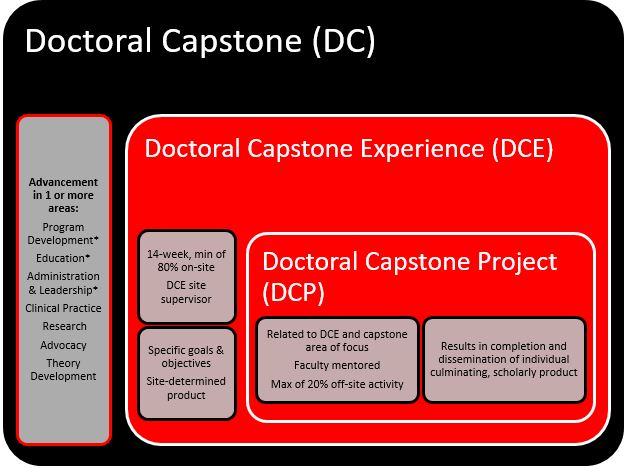Doctor of Occupational Therapy Capstone
Doctoral Capstone
An integral part of the program curriculum, the Doctoral Capstone (DC) provides an in-depth exposure to one or more of the following areas:
- administration and leadership,
- program development,
- education,
- clinical practice skills,
- research skills,
- advocacy,
- and theory development.
It consists of two parts: (1) the capstone experience and (2) the capstone project.
*Areas of program emphasis/specialty.
Doctoral Capstone Experience (DCE)
The DCE develops occupational therapists with advanced skills, beyond the level of a generalist, in one or more of the DC areas. The DCE occurs at a mentored practice setting known as the DCE site. The Doctoral Capstone Coordinator (DCC) will collaborate with the student to establish the DCE site and the required written memorandum of understanding. During the DCE, the student is mentored by an individual with expertise consistent with the student’s DC area of focus. This mentor, known as the DCE site supervisor, does not have to be an occupational therapist. More than one student may be present and working collaboratively at the DCE site at the same time; however, each student will have individual capstone objectives and focus.
The 14-week (560 hours) DCE, beginning in January of the third year, must be completed after completion of all coursework, Level II fieldworks, and required preparatory activities (i.e., literature review, needs assessment, goals/objectives, and evaluation plan). No more than 20% of the 560 hours can be completed off-site from the DCE site. The DCE is NOT a third Level II fieldwork. As such, the student will identify goals and objectives, requiring approval in advance of the DCE, to achieve the identified advanced skill and in-depth experience. The objectives for the DCE will overlap with the capstone project objectives; however, additional objectives and tasks specific to opportunities within the DCE site will also be developed. All DCE sites are located in the Lubbock area.
Doctoral Capstone Project (DCP)
The DCP develops occupational therapists’ capacities to engage in scholarly activities. The student completes an individual culminating product to demonstrate synthesis and application of knowledge gained in one or more of the DC areas. The DCP is a highly student-driven process; however, the student works in collaboration with a faculty capstone mentor and possibly a DCE site supervisor to develop an individual plan to achieve advanced learning objectives and produce evidence of scholarship.
The student engages in preparatory activities for the DCP during coursework and prior to the DCE that includes a literature review, needs assessment, goals/objectives, and an evaluation plan. The student must have an approved DC proposal prior to beginning the DCE. The student then engages in scholarship that supports the DCP during the DCE. Following the DCE, the student finalizes and disseminates his/her DCP. Examples of products that may document this scholarship include a written manuscript, presentation, case report, treatment manual, curriculum, grant proposal, quality improvement project report, program proposal, policy/procedure manual, video, series of marketing or educational materials, or portfolio/photo log/scrapbook. Capstones requiring IRB processes will only be granted on joint projects with academic/professional research teams. The student presents his/her DCP at the TTUHSC OTD Research Symposium prior to graduation.
Program Contact for Doctoral Capstone Inquiries
For more specific questions, please contact the TTUHSC’s Doctoral Capstone Coordinator:
Laurie Stelter, OTR, PhD
Laurie.stelter@ttuhsc.edu
806-743-3273

